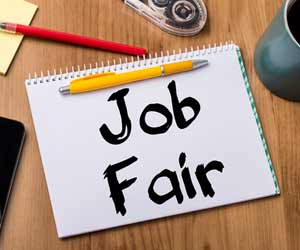Hold a Career Event or Job Fair
Have you thought about what you’ll do once you’re re-employed? For sure, you’ll learn the job, catch up on bills, and maintain your network. But wouldn’t it be something if you found yourself hosting a job fair, or at least, tending a booth for your new company? After all, you may have more experience with job fairs after your own job hunt than anyone else on staff!
Even if your new company doesn’t tap you for a job fair stint, you may decide to share some of your new expertise as a volunteer for an organization helping others to find work. If that happens, you’ll want to have some ideas about how to make it a successful event for everyone involved. Here are a few tips to help you enjoy your time on the other side of the table at a job fair.

First, some tips for the overall organization of the job fair.
Choose the location with care. Locating the fair downtown may make sense for the employers, but will it mean job seekers have to pay for parking? There won’t be one perfect location for everyone, but in general it’s better to plan for the participant’s convenience, as they have more obstacles to overcome.
Promote the job fair fully. Of course you’re going to announce the fair, its location and the date. But are you telling job seekers about the extra events, or key employers who have signed on? In an ideal world, the fair would be noted on the Internet, with a full list of participating companies and links to their sites.
Use a media partner if possible. Even if your participation is limited to hosting a booth at the fair, it’s worth asking a local paper or radio station if they will mention the fair (and your company) to their readers and listeners. If you have a larger role in planning the job fair, try to sign on a media partner early in the process. These are sponsors who may not pay to participate, but who instead offer advertising in exchange for a booth or shared publicity.
Set up the fair with participant comfort in mind. You know how difficult it is to be on your feet all day; why not station chairs, or water coolers or some other comforts throughout the fair?
And now some tips for your booth.
Bring materials of interest to job seekers. Too often the booths at job fairs are simply re-purposed trade-show displays, with big posters touting a company’s products. While that’s better than nothing, best yet would be a display created to tell job seekers about the company as a workplace. Of course, if you have current openings, that is always a most welcome part of a job fair booth.
Use stools instead of chairs. Or, consider putting the stools in front your table instead of behind it. Why? Because you’ll look more inviting to job seekers as they pass by. Also, if the booth happens to be staffed by less outgoing personnel (try not to let that happen), it will keep them from “hiding” behind the table.
Prepare information for your booth reps to share. Some questions from job seekers can be anticipated. They will ask what the company does, where the most growth is likely to occur, what is expected of job candidates, and whom they should contact for further information. And don’t direct job seekers to the web site. In most cases you can bet they have already been to the site. Besides, if the entire interaction could be handled online, why would you be at the fair?
Ask questions. Some job seekers have difficulty in situations like this. To make the conversation more fruitful, be ready to ask what their work history has been, or which jobs they’re seeking now. You may not have anything for them, but it makes sense to find out what they can do.
Plan for your post-fair process. Whatever followup you will conduct can be made smoother by bringing along folders or boxes marked with the followup activity. For example, a box marked “call” can hold the resumes of the candidates you want to contact immediately, while a box marked “forward” can be for those whose resumes you want to distribute.
Can you stand one last tip? This might be the most important one of all: Don’t pack up early. It’s tempting to start packing when the fair gets quiet. After all, what’s the harm in leaving 30 minutes early? Just this: You may miss the best candidates. The job seeker who arrives after a day of work or classes is the go-getter you want to meet. So bring a book if you have to, and sit tight. And ponder this: Not so long ago, you were the person rushing to make it to the fair on time; now you’re the one who can make the difference for someone else. Life is sweet.

